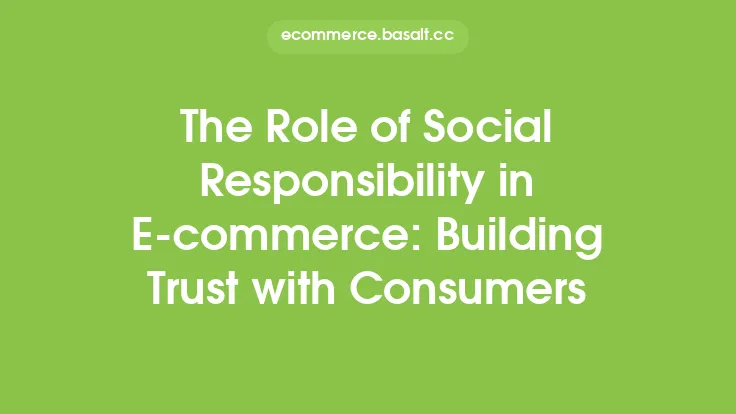The world of e-commerce has undergone a significant transformation in recent years, with consumers becoming increasingly aware of the social and environmental impact of their purchasing decisions. As a result, ethical consumerism has emerged as a major trend, with shoppers seeking out companies that prioritize social responsibility and sustainability. This shift in consumer behavior has forced e-commerce businesses to re-evaluate their practices and adapt to the changing landscape.
Introduction to Ethical Consumerism
Ethical consumerism refers to the practice of making purchasing decisions based on the social and environmental impact of a product or company. This can include factors such as labor practices, environmental sustainability, and community involvement. Ethical consumers are willing to pay a premium for products that align with their values and are more likely to remain loyal to companies that demonstrate a commitment to social responsibility. As the demand for ethical products continues to grow, e-commerce businesses are recognizing the importance of incorporating social responsibility into their business models.
The Benefits of Social Responsibility in E-commerce
Incorporating social responsibility into an e-commerce business can have numerous benefits, including increased customer loyalty, improved brand reputation, and access to new markets. Companies that prioritize social responsibility are seen as more trustworthy and authentic, which can lead to increased customer retention and positive word-of-mouth. Additionally, social responsibility can be a key differentiator in a crowded market, allowing e-commerce businesses to stand out from their competitors. By prioritizing social responsibility, e-commerce businesses can also attract a new generation of consumers who are passionate about sustainability and social justice.
Key Principles of Social Responsibility in E-commerce
There are several key principles that e-commerce businesses can follow to demonstrate their commitment to social responsibility. These include transparency, accountability, and fairness. Transparency involves being open and honest about business practices, including supply chain management and environmental impact. Accountability involves taking responsibility for the social and environmental impact of business practices and making amends when necessary. Fairness involves ensuring that all stakeholders, including employees, customers, and suppliers, are treated with respect and dignity. By following these principles, e-commerce businesses can build trust with their customers and demonstrate their commitment to social responsibility.
The Role of Technology in Promoting Social Responsibility
Technology has played a significant role in promoting social responsibility in e-commerce. Social media platforms, for example, have provided a powerful tool for consumers to raise awareness about social and environmental issues. E-commerce businesses can use social media to engage with their customers, share information about their social responsibility initiatives, and promote sustainable products. Additionally, technology has enabled e-commerce businesses to track and measure their social and environmental impact, making it easier to identify areas for improvement. By leveraging technology, e-commerce businesses can promote social responsibility and demonstrate their commitment to sustainability.
Best Practices for Implementing Social Responsibility in E-commerce
There are several best practices that e-commerce businesses can follow to implement social responsibility into their business models. These include conducting regular social and environmental audits, setting clear goals and targets for social responsibility, and engaging with stakeholders to ensure that their needs are being met. E-commerce businesses can also prioritize sustainable supply chain management, ensuring that their suppliers are adhering to strict social and environmental standards. By following these best practices, e-commerce businesses can demonstrate their commitment to social responsibility and build trust with their customers.
The Future of Ethical Consumerism in E-commerce
The future of ethical consumerism in e-commerce looks bright, with consumers continuing to prioritize social responsibility and sustainability. As the demand for ethical products continues to grow, e-commerce businesses will need to adapt to the changing landscape and prioritize social responsibility. This may involve investing in sustainable supply chain management, reducing waste and emissions, and promoting fair labor practices. By prioritizing social responsibility, e-commerce businesses can build trust with their customers, improve their brand reputation, and contribute to a more sustainable future. As the e-commerce industry continues to evolve, it is likely that social responsibility will become an increasingly important factor in determining the success of online retailers.





